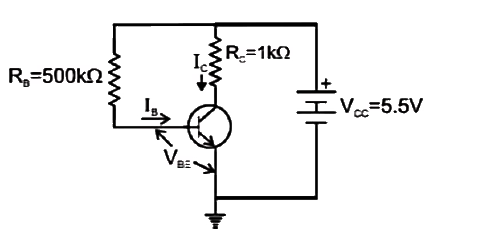A transistor is used in common-emitter mode in an amplifier circuit. When a signal 20mV is added to the base-emmiter voltage,the base current changes by and the collector current changes by 2mA.The load resistance is .Calculate (a)the factor(b)the input resistance (c) the transconductance and (d) the voltage gain .
(a)=(Delta)I_(C)/(Delta)I_(B)=2mA/20(mu)A=100.R_(BE)=((Delta)V_(BE))/((Delta)I_(B)20mV/20(mu)A=1k(Omega).=(Delta)I_(C)/V_(BE)
(d)the change signal voltage is
The applied signal vlotage =20mV.
Thus,the voltage gain is,
Topper's Solved these Questions
- BOOK - HC VERMA ENGLISHCHAPTER - SEMICONDUCTOR AND SEMICONDUCTOR DEVICESEXERCISE - objective I13videos
SEMICONDUCTOR AND SEMICONDUCTOR DEVICES
- BOOK - HC VERMA ENGLISHCHAPTER - SEMICONDUCTOR AND SEMICONDUCTOR DEVICESEXERCISE - objective II8videos
SEMICONDUCTOR AND SEMICONDUCTOR DEVICES
- BOOK - HC VERMA ENGLISHCHAPTER - SEMICONDUCTOR AND SEMICONDUCTOR DEVICESEXERCISE - Question for short answer11videos
SEMICONDUCTOR AND SEMICONDUCTOR DEVICES
- BOOK - HC VERMA ENGLISHCHAPTER - PHOTOMETRYEXERCISE - All Questions38videos
PHOTOMETRY
- BOOK - HC VERMA ENGLISHCHAPTER - SPEED OF LIGHTEXERCISE - Question for short Answer5videos
SPEED OF LIGHT
Similar Questions
A transistor is used in Common-emitter mode in an amplifier circuits. When a signal of 20 mV is added to the base-emitter voltage, the base current changes by 40μA and the collector current changes by 2mA. The load resistance is 5kΩ then the voltage gain is
View SolutionA transistor is used in CE mode in an amplifier circuit. When a signal of 40 mV is added to base-emitter voltage, the base current changes by 40μA and collector by 6mA. The load resistance is 10kΩ . Calculate
(i) The current gain β
(ii) The input resistance RBEView Solution
Knowledge Check
- Question 1 - Select One
The input resistance of a transistor is 1000Ω on charging its base current by 10μA, the collector current increases by 2 mA. If a load resistance of 5kΩ is used in the circuit, the voltage gain of the amplifier is
A100B500C1000D1500
In a common emitter amplifier , when a signal of 40 mV is added to the input voltage, the base current changes by 100μA and emitter current changes by 2.1mA the trans-conductance is
View SolutionIn the CB mode of a transistor, when the collector voltage is changed by 0.5 volt. The collector current changes by 0.05mA. The output resistance will be
View SolutionAp−n−p transistor is used in common-emitter mode in an amplifier circuuit. A change of 40μA in the base current brings a change of 2mA in collector current and 0.04V in base-emitter volatage. Find the
(a) input resistance ri and
(b) the base current amplification factor (β).
(c ) if a load of 6kΩ is used, then also find the voltage gain of the amplifier.View SolutionAn NPN transistor is used in common emitter configuration as an amplifier with 1kΩ load resistance. Signal voltage of 10 mV is applied a across the base-emitter. This produces a 3 mA change in the collector current and 15μA change in the base currect of the amplifier. The input resistance and voltage gain are :
View SolutionA transistor is used as a common emitter amplifier with a load resistance of 2kΩ. The input resistance is 150Ω. Base current is changed by 20μA which results in change in collector current by 1.5 mA. The voltage gain of the amplifier is
View SolutionA transistor is operated in common emitter configuration at Vc=2V such that a change in the base current from 100μA to 300μA produces a change in the collector current from 10mA to 20mA. The current gain is
View SolutionIn the circuit shown in figure,the base current IB is 10μA and the collector current is 5.2 mA . The voltage (VBE) across the base and emitter is
 View Solution
View Solution

